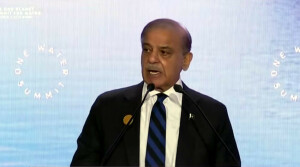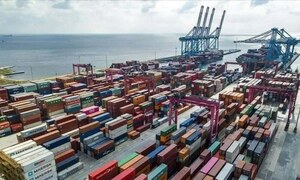The pervasive air of economic uncertainty continues to prevail in the country in spite of repeated assurances by Prime Minister Imran Khan, faithfully echoed by Finance Minister Asad Umer, that the economy is on the path towards recovery. The reason: with the passage of time persistent accusations against the previous administration(s) for the continuing economic impasse, without taking appropriate measures to deal with the crises other than to procure loans from 'friendly countries', is leaving the market unresponsive to claims of the recovery process having started.
On Tuesday, the stock market came under pressure losing 0.06 points with foreign investors liquidating 7.3 million dollars of their holdings - an indication that market perception is that all is not well. The reason for the uncertainty, economists are agreed, is partly linked to the failure of the administration to initiate policies focused on reducing the budget deficit. Revenue shortfall in the current year compared to the year before is in absolute terms rather than in the percentage growth rate as in previous years and expenditure has risen dramatically mainly on account of defense raise. Ministers dealing with the economy are dismissing the decline in revenue by focusing on the fact that budgeted revenue has never ever been achieved however the issue today is a decline in overall revenue mainly attributed to collections under non-tax revenue.
With respect to expenditure the relevant ministers are silent though they extol the Prime Minister's austerity drive whereby there has been a reduction, in percentage terms, in the expenditure of the Prime Minister's House and similar measures though to a lesser degree have been taken by other ministers. While the message is much appreciated notably that the executive branch of government is reducing its budgeted expenditure (instead of laying the entire onus on the general public to meet rising current expenditures) yet in the overall context of the country's annual budget the amount saved is little more than 1 percent of Pakistan's total budget. In contrast the Prime Minister's large cabinet, rivaling that of his predecessor, sends the wrong message to the public and allows his critics to challenge his claims of savings by the cabinet as the following table shows:
========================================================
Cabinet Nawaz Shahid Imran
Sharif Khaqan Khan
Abbasi
========================================================
Federal ministers 23 32 24
Ministers of state 14 15 5
Advisor/Special assistant
with status of minister
/minister of state 6 12 13
Total 43 59 42
========================================================
Shahid Khaqan Abbasi, selected by the party leader Nawaz Sharif to replace him after his disqualification, did not command the loyalty from within his own party and coalition partners necessitating a 37 percent increase in the federal cabinet. Prime Minister Imran Khan's Special Advisor Naeemul Haq recently stated that the Prime Minister is considering a cabinet reshuffle as well as a possible expansion, which may lead to Cabinet numbers close to Shahid Khaqan Abbasi's which would no doubt indicate Imran Khan's political compulsion.
Additionally, economies are required in the business of running government and so far there is no sharing of the report on civil service reforms drafted by a retired international bureaucrat and former State Bank Governor Ishrat Hussain, though the Prime Minister as well as Hussain have launched a spirited defense of keeping the bureaucracy safe from 'frivolous' investigations by the National Accountability Bureau (NAB) - the very same bureaucracy without whose complicity previous administrations would have found it challenging to say the least to engage in corruption or nepotism. However Prime Minister Khan also periodically refers to the need to de-politicise the bureaucracy but has taken some decisions during his short tenure that indicate the reverse - examples being the Pakpattan DPO and Islamabad IG's transfers.
The second, with some considering it the foremost factor creating uncertainty, is the lack of a result in the ongoing negotiations with the International Monetary Fund (IMF) considering that Asad Umer formally requested a package on 11 October 2018. The Fund mission arrived in Pakistan early November for two weeks but negotiations remained inconclusive. Thence began hectic activity on the foreign relations front and the government secured 6 billion dollars from Saudi Arabia (3 billion dollars as a one year loan to be parked in the State Bank of Pakistan for balance of payment support and another 3 billion dollars as deferred oil facility), 6.2 billion dollars from United Arab Emirates (3 billion dollars to be parked for a year at the SBP and 3.2 billion dollars oil deferred facility though Asad Umer recently acknowledged that the oil facility may be withdrawn) and commercial loan from China up to 2.5 billion dollars. These loans are focused on reducing the current account deficit of 19 billion dollars for the ongoing year and not for reducing the unsustainable budget deficit implying thereby that this problem is exacerbating with the passage of time.
If the government goes on the IMF programme the comfort level of investors, domestic and international, would rise given that the Fund strictly monitors whether the agreed macroeconomic stabilization plan is being implemented and, at the same time, other multilateral/bilateral sources of finance would become available, specifically for budget support. If the country does not go on an IMF programme then unless the revenue base is strengthened with revenue sources identified being more realistic than merely referring to technology improving revenue generation by over 90 billion rupees (first amendment finance bill) or raising expenditure (industrial package courtesy finance bill amendment 2) the budget deficit would continue to reach ever rising unsustainable levels.
Asad Umer stated last week that the gap with the IMF over reforms is narrowing while the country director of the IMF, who would not be the mission leader, stated that "no economy could sustain on loans, Pakistan must take immediate corrective measures to enhance tax collection by broadening the tax base." One would hope that Khan's government, unlike the previous government, focuses on reducing current expenditure, and raising revenue though in the short term existing sources of revenue would have to be relied on if the deficit for the current year is to be brought down to sustainable levels (leading to IMF conditions being less politically challenging). Disturbingly so far no such measures have been discussed publicly leave alone implemented.





















Comments
Comments are closed.